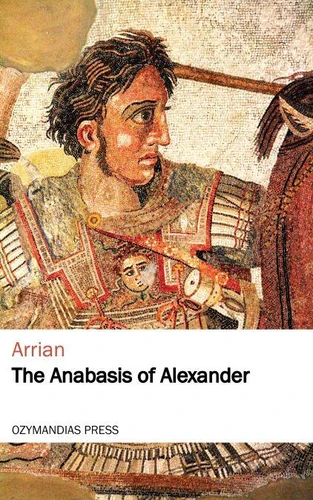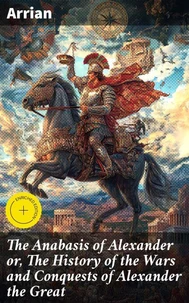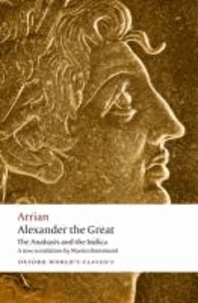The Anabasis of Alexander
Par :Formats :
Disponible dans votre compte client Decitre ou Furet du Nord dès validation de votre commande. Le format ePub est :
- Compatible avec une lecture sur My Vivlio (smartphone, tablette, ordinateur)
- Compatible avec une lecture sur liseuses Vivlio
- Pour les liseuses autres que Vivlio, vous devez utiliser le logiciel Adobe Digital Edition. Non compatible avec la lecture sur les liseuses Kindle, Remarkable et Sony
 , qui est-ce ?
, qui est-ce ?Notre partenaire de plateforme de lecture numérique où vous retrouverez l'ensemble de vos ebooks gratuitement
Pour en savoir plus sur nos ebooks, consultez notre aide en ligne ici
- Nombre de pages437
- FormatePub
- ISBN978-1-5312-8444-2
- EAN9781531284442
- Date de parution10/04/2018
- Protection num.Digital Watermarking
- Taille807 Ko
- Infos supplémentairesepub
- ÉditeurJovian Press
Résumé
The Anabasis is by far the fullest surviving account of Alexander's conquest of the Persian empire. It is primarily a military history, reflecting the content of Arrian's model, Xenophon's Anabasis; the work begins with Alexander's accession to the Macedonian throne in 336 BC, and has nothing to say about Alexander's early life (in contrast, say, to Plutarch's Life of Alexander). Nor does Arrian aim to provide a complete history of the Greek-speaking world during Alexander's reign.
Arrian's chief sources in writing the Anabasis were the lost contemporary histories of the campaign by Ptolemy and Aristobulus and, for his later books, Nearchus. One of Arrian's main aims in writing his history seems to have been to correct the standard "Vulgate" narrative of Alexander's reign that was current in his own day, primarily associated with the lost writings of the historian Cleitarchus.
Arrian's chief sources in writing the Anabasis were the lost contemporary histories of the campaign by Ptolemy and Aristobulus and, for his later books, Nearchus. One of Arrian's main aims in writing his history seems to have been to correct the standard "Vulgate" narrative of Alexander's reign that was current in his own day, primarily associated with the lost writings of the historian Cleitarchus.
The Anabasis is by far the fullest surviving account of Alexander's conquest of the Persian empire. It is primarily a military history, reflecting the content of Arrian's model, Xenophon's Anabasis; the work begins with Alexander's accession to the Macedonian throne in 336 BC, and has nothing to say about Alexander's early life (in contrast, say, to Plutarch's Life of Alexander). Nor does Arrian aim to provide a complete history of the Greek-speaking world during Alexander's reign.
Arrian's chief sources in writing the Anabasis were the lost contemporary histories of the campaign by Ptolemy and Aristobulus and, for his later books, Nearchus. One of Arrian's main aims in writing his history seems to have been to correct the standard "Vulgate" narrative of Alexander's reign that was current in his own day, primarily associated with the lost writings of the historian Cleitarchus.
Arrian's chief sources in writing the Anabasis were the lost contemporary histories of the campaign by Ptolemy and Aristobulus and, for his later books, Nearchus. One of Arrian's main aims in writing his history seems to have been to correct the standard "Vulgate" narrative of Alexander's reign that was current in his own day, primarily associated with the lost writings of the historian Cleitarchus.







